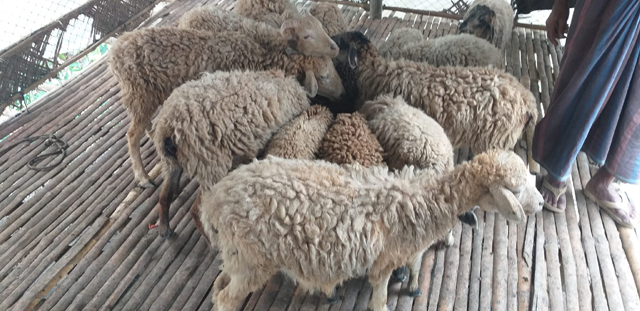
By Dr Md Aynal Haque
RAJSHAHI, July 8, 2023 (BSS)- Many of the marginalized households have
improved their living and livelihood conditions through rearing sheep in the
region, including its vast Barind tract, during the last couple of years.
Abdul Mannan, 53, of Mollapara village under Godagari upazila has become
self-reliant through sheep farming.
With his curiosity Mannan had procured two sheep from one of her neighbours
around eight years back and started its rearing. Now, he has 26 sheep.
He along with many of his co-villagers was imparted a five-day training on
intensive sheep farming besides marking it profitable and sustainable by the
nearby Demonstration Sheep Farm (DSF).
Mannan said the sheep farming has eradicated his poverty and enhanced his
dignity in the society. He gets money, meat and milk from it regularly.
Habiba Khatun, wife of Abdul Kuddus, a farmer of Rajabari in Godagari
upazila, has become an icon in the field of sheep farming.
Now, she is leading a very happy life with her family as she became very
successful and self-reliant through rearing the sheep. She is also helping
the women who want to grow sheep farms.
Anandi Saren, daughter of Mikhail Saren in Sundarpur village of Godagari
upazila in Rajshahi, has attained success through efficiency in the micro-
level venture.
After getting one sheep as donation on a voluntary basis in 2017, she
enhanced the number to 15 at present by dint of her much attentiveness and
devotion to the sheep rearing venture.
Mita Mormu, 15, a student of class nine in Kakonhat Girls High School, has
found the path of generating income through sheep farming.
She said sheep farming has a vital role towards women empowerment and poverty
reduction at the grassroots level. Many of the students have attained success
through sheep farming, she added.
She said the single lamb was her lifeline for taking the poverty-prone family
to a stable position. But her initial stage was not happy as many of her
neighbors criticized the sheep farming initiative.
Mormu said the sheep farming has eradicated her poverty and enhanced her
dignity in the society. She gets money, meat and milk from it regularly.
Like them, 125 ethnic minority households were given 145 sheep in Godagari,
Tanore and Chapainawabganj Sadar upazilas since 2017 with the main thrust of
facilitating them to continue their respective institutional learning through
the sheep rearing income.
Jahangir Alam Khan, coordinator of Integrated Water Resource Management
Project, said the incidence of child marriage among the ethnic minority girls
is comparatively high because of their dropout from school due to financial
constraint.
He said they have given sheep among the students so that they can improve
their living and livelihood conditions through rearing.
Motivating and inspiring the landless, small and low-income people to attain
their self-reliance through sheep farming is another motto of the initiative.
Many other people of Paba and Godagari upazilas have changed their socio-
economic condition by rearing sheep commercially. They have been making
handsome money.
On behalf of the 'Validation of Good Practices of On-farm Lamb Production
System' project, 59 farmers were given 600 lambs besides imparting them with
need-based training on how to rear those in the two upazilas.
The project intends to boost the supply of nutritious lamb meat with
improving the living and livelihood condition of the marginal farmers through
rearing lambs.
Professor Jalal Uddin Sarder of the Department of Veterinary and Animal
Sciences at Rajshahi University (RU) said there is no protein-value
difference between the meat of sheep and goat or cattle.
Even sheep meat is enriched with more protein in comparison to goat and
cattle.
He said sheep are more resistant to disease than other domestic animals,
adding the household-based sheep farming, after using modern methods and
technologies, can be a vital means of meeting up the nutritional demand in
the region.
The issue of improvement and conservation of native sheep in society-based
farms should be given priority for the greater interest of poverty reduction
and self-employment through the best use of enormous opportunities in the
sector.